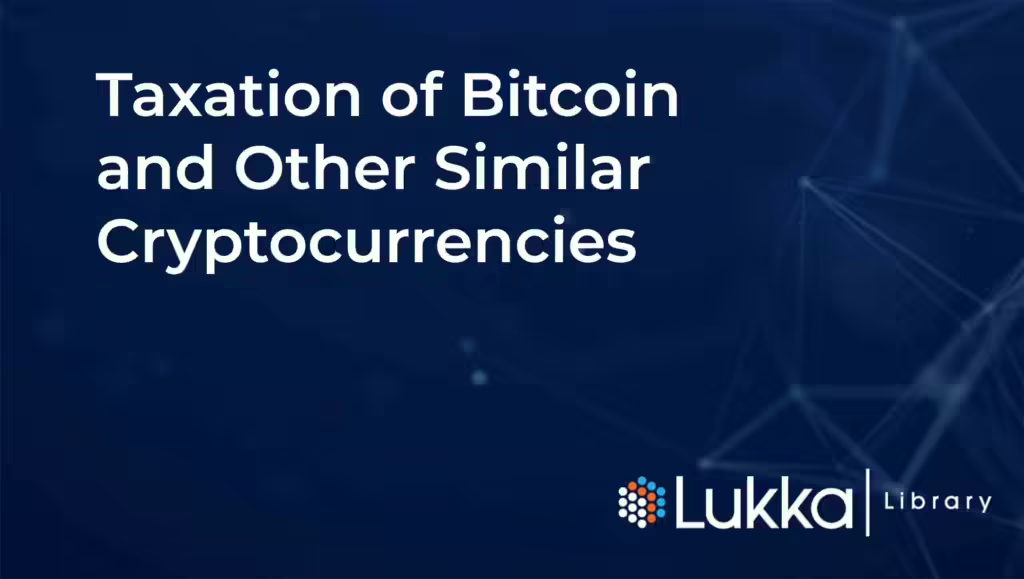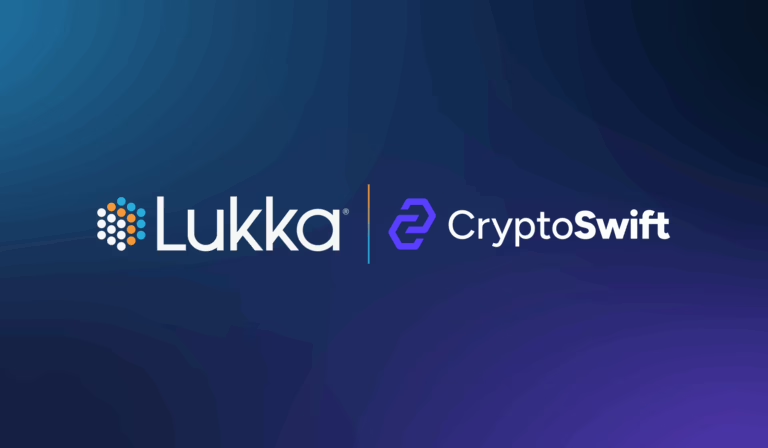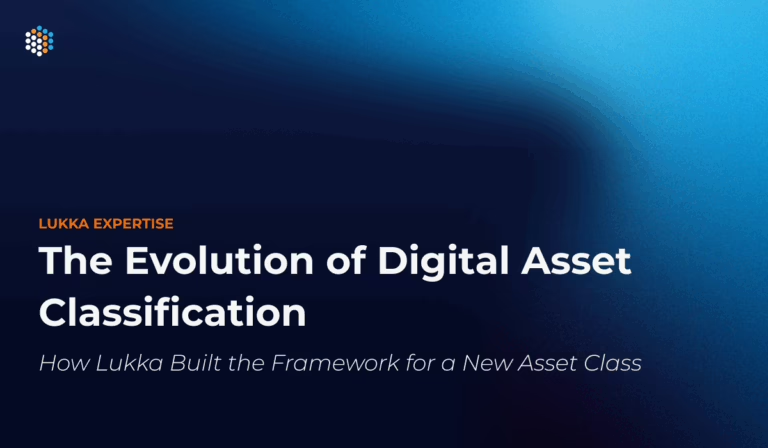Author: Jo Crookshank, Partner; Simmons & Simmons, LLP.
The discussion in this document reflects legal principles as of February 13, 2020.
An overview of the UK tax treatment of Bitcoin and similar cryptocurrencies, following the publication of HMRC guidance.
There has been increasing general interest in cryptocurrencies, such as Bitcoin, ICO tokens and the technology behind such currencies and tokens in recent years. Naturally, much of this focus has been on the valuation of such currencies and tokens – and the profits or losses that individuals holding such currencies and tokens might make. However, what is the tax treatment of Bitcoin, other cryptocurrencies and tokens? Are gains subject to tax in the UK?
HM Revenue & Customs (HMRC) has released updated guidance on the tax treatment of individuals on such cryptocurrencies and certain exchange tokens (referred to by HMRC as “cryptoassets”) in its policy paper, “Cryptoassets for individuals”. The paper expands on guidance previously issued in Revenue & Customs Brief 9/2014, which dealt only with Bitcoin and similar cryptocurrencies, but essentially confirms that, depending on an individual’s personal circumstances, transactions in relevant cryptoassets will either be subject to income tax as trading income or subject to capital gains tax (CGT) on the disposal of a chargeable asset.
Background
Cryptocurrencies are a type of digital money. The first cryptocurrency was Bitcoin but since its release in 2009, there is now a proliferation of different types. Cryptocurrencies can be bought or sold with other currencies, used to purchase goods from sellers who are willing to accept cryptocurrencies as payment, used to make investments in various assets and are being retained as investments themselves. Given the unique proprietary features of Bitcoin, there appears to be a degree of uncertainty and ambiguity as to whether Bitcoin and other similar cryptocurrencies would, legally, qualify as property for English law purposes. However, the better view appears to be that the English courts would recognise the ownership rights which a person has in Bitcoin, despite any formal difficulties in the application of traditional features of English law.
The technology which allows cryptocurrencies to work is known as “blockchain technology”. The blockchain is a database containing evidence of transactions between different users. Multiple networked computers hold all or part of a sequence of information, which is arranged into “blocks”. The information is sequenced in chronological order and added to the blockchain by the network without reference to users’ identities or personal details. The updated blockchain is then saved so rapidly across the network that it is almost impossible for a hacker to change the information contained on every single computer on the network in order to manipulate a transaction (assuming there are no vulnerabilities in the software). This effectively means that once a transaction has been recorded, it cannot be edited or deleted. It therefore acts as a distributed digital ledger that is secure and usually anonymous.
In HMRC’s latest guidance, HMRC also addresses formally the position of “exchange tokens” which encompass cryptocurrencies such as Bitcoin. HMRC defines such exchange tokens as being intended for use as a method of payment, making use of distributed ledger technology, and where the value of the tokens is based on its use as a means of exchange or investment, rather than being underpinned by any person, group or asset. HMRC distinguishes this form of token from utility or security tokens, as they do not confer any rights or access to goods or services, nor do they provide a debt or profits interest in a business.
Taxation of currencies generally
Where a person trades in foreign currencies on a regular basis, then the profits of that trade may be subject to tax as trading profits (and within the scope of income tax or corporation tax as appropriate).
In the absence of trading, all forms of property, other than sterling, are assets for CGT purposes. As such, foreign currency is an asset for CGT purposes and the disposal of foreign currency may, therefore, give rise to chargeable gains or allowable losses. In addition to the sale of foreign currency for sterling, there is also a disposal if foreign currency is used to purchase an asset, for example. From a VAT perspective, transactions, including negotiation, concerning currency, bank notes and coins used as legal tender are exempt from VAT, with the exception of collectors’ items, ie gold, silver or other metal coins or bank notes which are not normally used as legal tender or coins of numismatic interest.
The taxation of profits on cryptocurrencies
In the UK, HMRC have recently provided updated guidance on the tax treatment of Bitcoin, other cryptocurrencies, and relevant exchange tokens (referred to as “cryptocurrencies” or “cryptoassets” in the rest of this note) in its policy paper, “Cryptoassets for individuals”. The guidance recognises two possible treatments for profits or gains made on cryptocurrencies:
- trading profits which will be subject to income tax, and
- capital gains which will be subject to CGT.
Income tax
Where an individual regularly buys and sells cryptocurrencies, the individual may be trading in cryptocurrencies and, as such, subject to income tax on the profits of the trade (or may accrue trading losses). Where losses arise, HMRC are likely to carefully consider if the badges of trade are present before allowing loss relief. In particular, the courts have previously given guidance that the courts should be wary of awarding “trading” status to an individual speculating in financial instruments and that the prima facie presumption should be that he or she is not. The guidance suggests that a trade in cryptoassets would be similar to a trade in financial instruments and therefore the same approach to determining whether or not a trade exists should, in general, apply. Whilst there is a possibility that transactions may be regarded as so highly speculative that the activity is akin to gambling or betting, such that any profits are not taxable as trading profits and any losses cannot be offset against other taxable profits, the guidance points out that HMRC do not consider the buying and selling of cryptoassets to be the same as gambling.
Employment income
Where cryptoassets are received as earnings for employment they will count as “money’s worth” and be subject to income tax and NICs on their value. An employer’s obligations in relation to crypto assets provided as earnings will depend on whether they amount to “readily convertible assets”. This in turn depends on whether there are “trading arrangements” in existence. Where there are trading arrangements (such as with Bitcoin), then employers must deduct and account to HMRC for PAYE and NICs, based on a best estimate of their value. Where cryptoassets are not RCAs, no PAYE obligation arises on the employer (instead the individual employee must report under self-assessment), but the employer must treat the award as a payment in kind and pay Class 1A NICs to HMRC.
Where a person is investing in cryptocurrencies, despite any formal legal uncertainty as to its nature, HMRC take the view that cryptocurrencies should be treated as intangible property and chargeable assets for CGT purposes. Accordingly, where a person buys and sells, for example, Bitcoin as an investment or buys Bitcoin and uses it as payment for other transactions, there will be CGT consequences. Since Bitcoin will be treated as an asset for CGT purposes, the buying and selling of Bitcoin will give rise to capital gains or capital losses as appropriate. Equally, where Bitcoin is used to buy other goods or services, the use of the Bitcoin as a currency will give rise to a disposal of the Bitcoin with taxable gains or losses arising. Similar considerations will arise where one cryptoasset is exchanged for another or cryptoassets are gifted to another person – in each case a disposal may arise for CGT purposes with any gain being subject to tax.
HMRC regard cryptoassets as fungible assets which should fall within the pooling rules. This means that, instead of tracking the gain or loss on any individual transaction, each type of crytoasset should be pooled and any transaction will result in a part disposal of the pool of assets. There are also special rules where a person acquires pooled assets within 30 days of disposing of the same assets. Where a cryptocurrency is subject to a “hard fork” creating a new cryptoasset, any allowable costs for pooling of the original cryptoassets will need to be allocated between the original and new cryptoasset pools. However, such a hard fork should not of itself amount to a disposal given rise to CGT liabilities.
The paper also provides guidance on the circumstances when a person may be able to make a “negligible value claim” to crystallise a capital loss on cryptoassets that have become worthless, including in circumstances where a person loses their private key. As cryptoassets are pooled, the claim must be made in respect of the entire pool.
Remittance basis
Where a person is resident but not domiciled in the UK and claims the remittance basis of taxation, income and gains which have a source outside the UK are only taxed if they are remitted to the UK. In December 2019, HMRC updated their guidance to state their view that cryptoassets will be located in the UK where the individual holder is resident in the UK. This means a person who holds such assets is liable to pay UK tax if they are a UK resident and carry out a transaction with their crypto assets which is subject to UK tax. HMRC argue that taking this approach provides a “clear, logical, predictable and objective rule which can be easily applied”. This approach will also be relevant for inheritance tax purposes.
An individual trading in Bitcoin in the UK would be treated as in receipt of profits arising in the UK and subject to UK tax regardless of whether they are a remittance basis user.
Mining cryptocurrencies
Cryptoassets may be awarded to “miners” for verifying additions to the blockchain digital ledger. Again, whether or not these activities amount to a trade will depend on a range of factors including the degree of activity and organisation. Where there is a trade, the cryptoassets received will be the taxable income of the trade. Otherwise, the cryptoassets received will be taxed as other miscellaneous income. Any fees or other rewards received in return for mining activities will also be taxed either as trading income or miscellaneous income.
Airdrops
An “airdrop” is where a person receives an allocation of cryptoassets, for example as part of a marketing or advertising campaign. Whether or not cryptoassets received as part of an airdrop are subject to income tax will depend on whether or not the recipient is expected to do anything in return or whether they are received as part of a trade or business involving such assets. If not, then cryptoassets received in a personal capacity as part of an airdrop may not be subject to income tax but instead are likely to be treated as an investment with any subsequent disposal within the scope of CGT.
VAT
The European Court of Justice has held that Bitcoin and other cryptocurrencies should be treated in the same way as other currencies for VAT purposes. Therefore, where a person pays consideration for the acquisition of Bitcoin, there is a supply that is exempt from VAT under Article 135(1)(e) of the VAT Directive, which exempts “transactions, including negotiation, concerning currency, bank notes and coins used as legal tender”.
HMRC’s guidance in Revenue & Customs Brief 9/2014 (which has not been updated in its latest note) goes further, however, and confirms the VAT treatment of a number of other features of Bitcoin and other cryptocurrencies:
- income received from Bitcoin mining activities will generally be outside the scope of VAT on the basis that the activity does not constitute an economic activity for VAT purposes because there is an insufficient link between any services provided and any consideration received
- income received by miners for other activities, such as for the provision of services in connection with the verification of specific transactions for which specific charges are made, will be exempt from VAT under Article 135(1)(d) of the VAT Directive as falling within the definition of “transactions, including negotiation, concerning deposit and current accounts, payments, transfers, debts, cheques and other negotiable instruments”, and
- charges (in whatever form) made over and above the value of the Bitcoin for arranging or carrying out any transactions in Bitcoin will also be exempt from VAT under Article 135(1)(d).
Comment
It should be noted that HMRC’s guidance recognises that cryptocurrencies and the technologies behind them will continue to evolve and that HMRC will need to continue to evaluate their tax treatment and will issue further guidance as appropriate. Indeed, whilst reliance may generally be placed on HMRC guidance, an investor or user of any such novel currencies should take care to consider the nature of the currency on a case by case basis. In addition, the latest guidance notes that HMRC may not apply the suggested treatment where it considers tax avoidance to be an issue. In addition, as noted above, the guidance recognises that there are other types of cryptoassets which are not “exchange tokens” (ie cryptoassets used as a method of payment, such as Bitcoin), but instead either “utility” or “security” tokens where different considerations may apply. It is to be hoped that HMRC will address the position of these other cryptoassets soon, particularly given the prevalence of utility tokens in the market.


